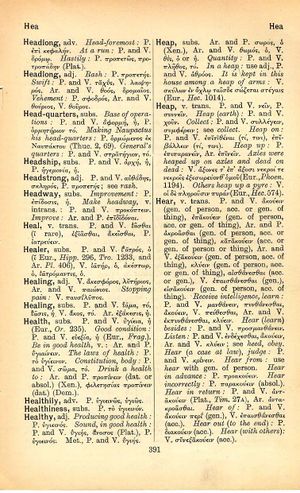hear
Ἱστοὶ γυναικῶν ἔργα κοὐκ ἐκκλησίαι → Muliebre telae sunt opus, non contio → Der Webstuhl ist der Frau Geschäft, nicht Politik
English > Greek (Woodhouse)
verb transitive
P. and V. ἀκούειν (gen. of person, acc. or gen. of thing), ἐπακούειν (gen. of person, acc. or gen. of things Ar. and P. ἀκροᾶσθαι (gen. of person, acc. or gen. of thing), κατακούειν (acc. or gen. of person or thing), Ar. and V. ἐξακούειν (gen. of person, acc. of thing), κλύειν (gen. of person, acc. or gen. of thing), αἰσθάνεσθαι (acc. or gen.), V. ἐπαισθάνεσθαι (gen.), εἰσακούειν (gen. of person, acc. of thing).
receive intelligence, learn: P. and V. μανθάνειν, πυνθάνεσθαι, ἀκούειν, V. πεύθεσθαι, Ar. and V. ἐκπυνθάνεσθαι, κλύειν.
hear (learn) besides: P. and V. προσμανθάνειν.
listen: P. and V. ἐνδέχεσθαι, ἀκούειν, Ar. and V. κλύειν; see heed, obey.
hear (a case at law), judge: P. and V. κρίνειν.
hear from: use hear with gen. of person.
hear in advance: P. προακούειν.
hear incorrectly: P. παρακούειν (absol.).
hear in return: P. and V. ἀντακούειν (Plato, Timaeus 27A), Ar. ἀντακροᾶσθαι.
hear of: P. and V. ἀκούειν περί (gen.), V. ἐπαισθάνεσθαι (acc.).
hear out (to the end): P. διακούειν (acc.).
hear (with others): V. συνεξακούειν (acc.).

